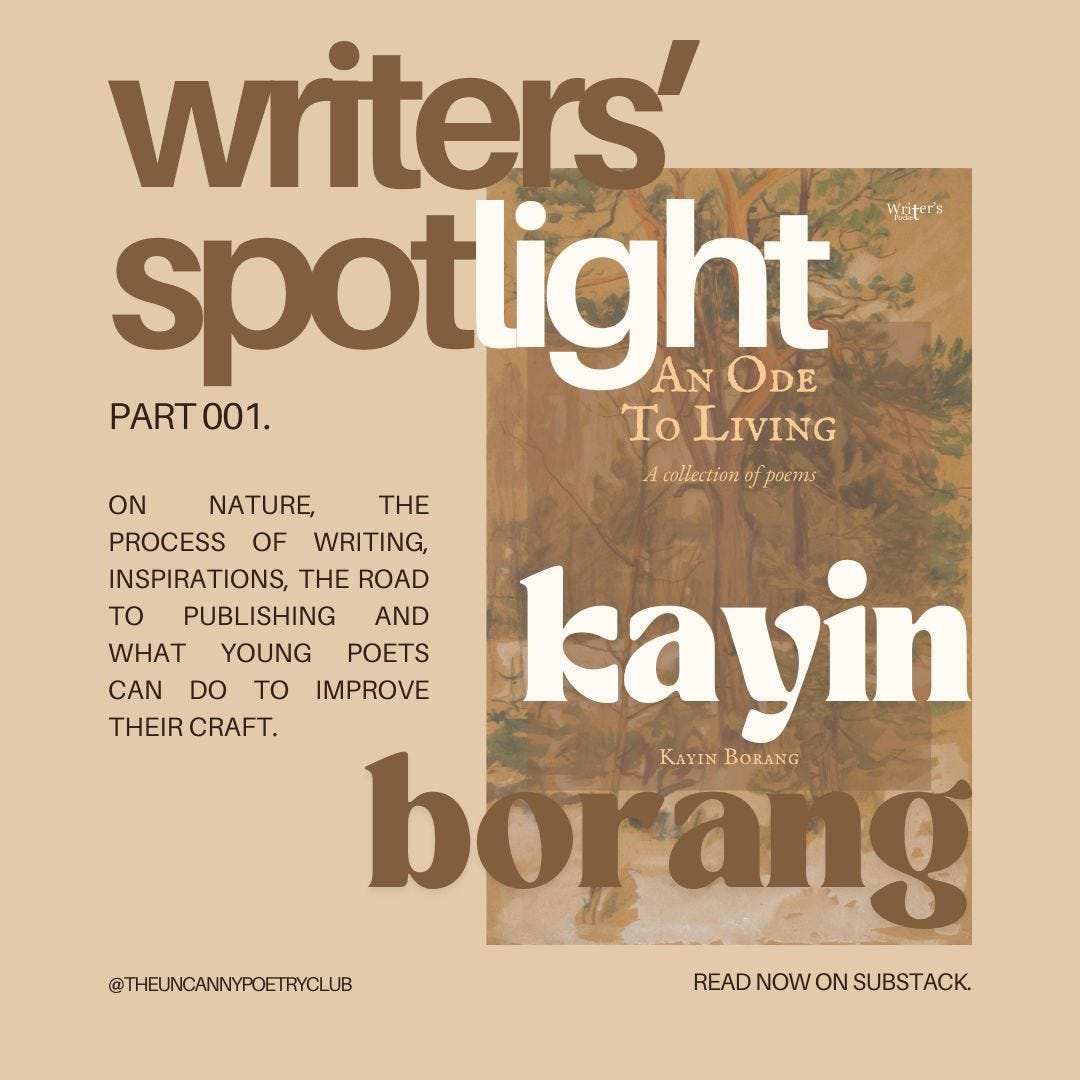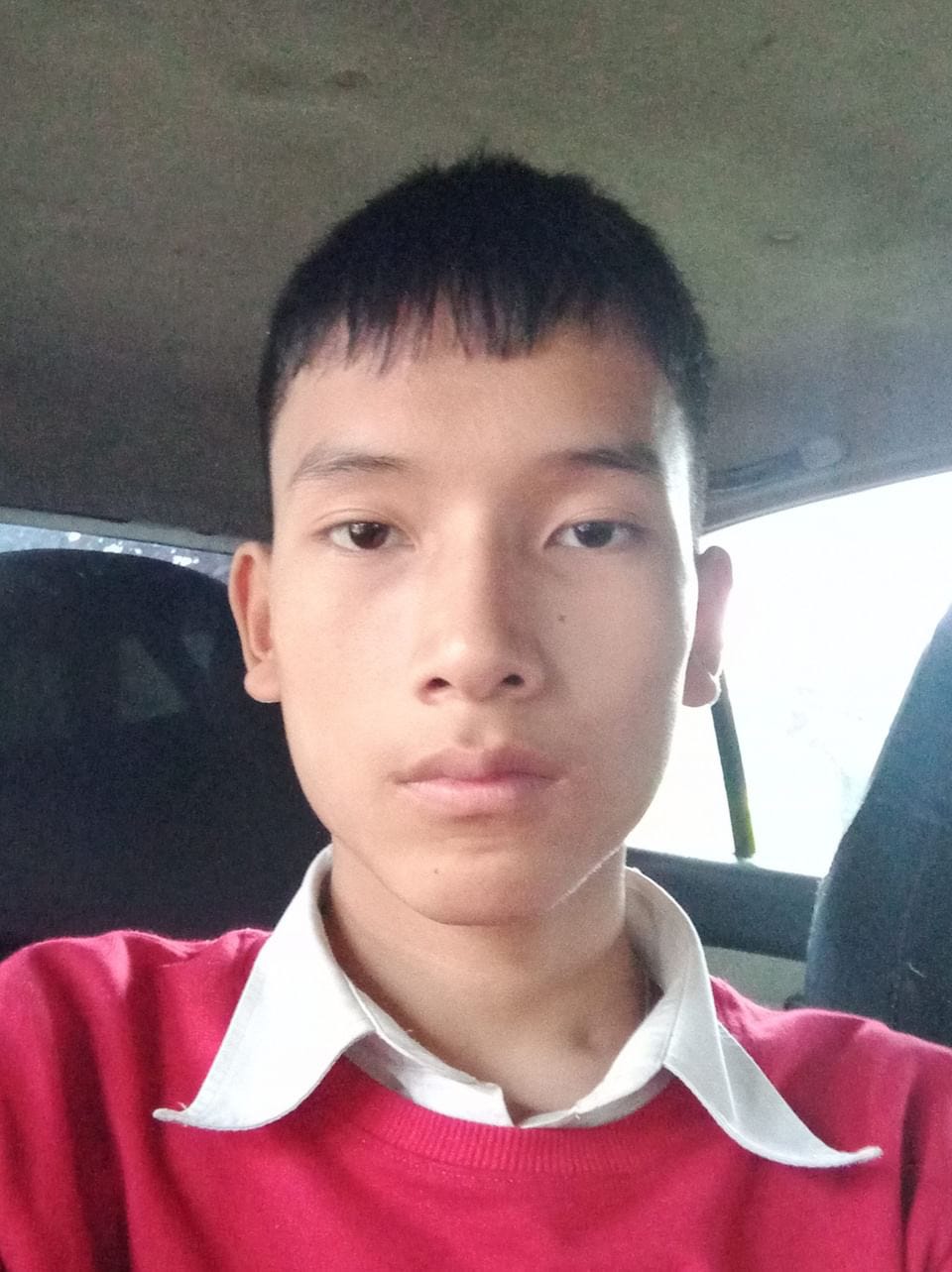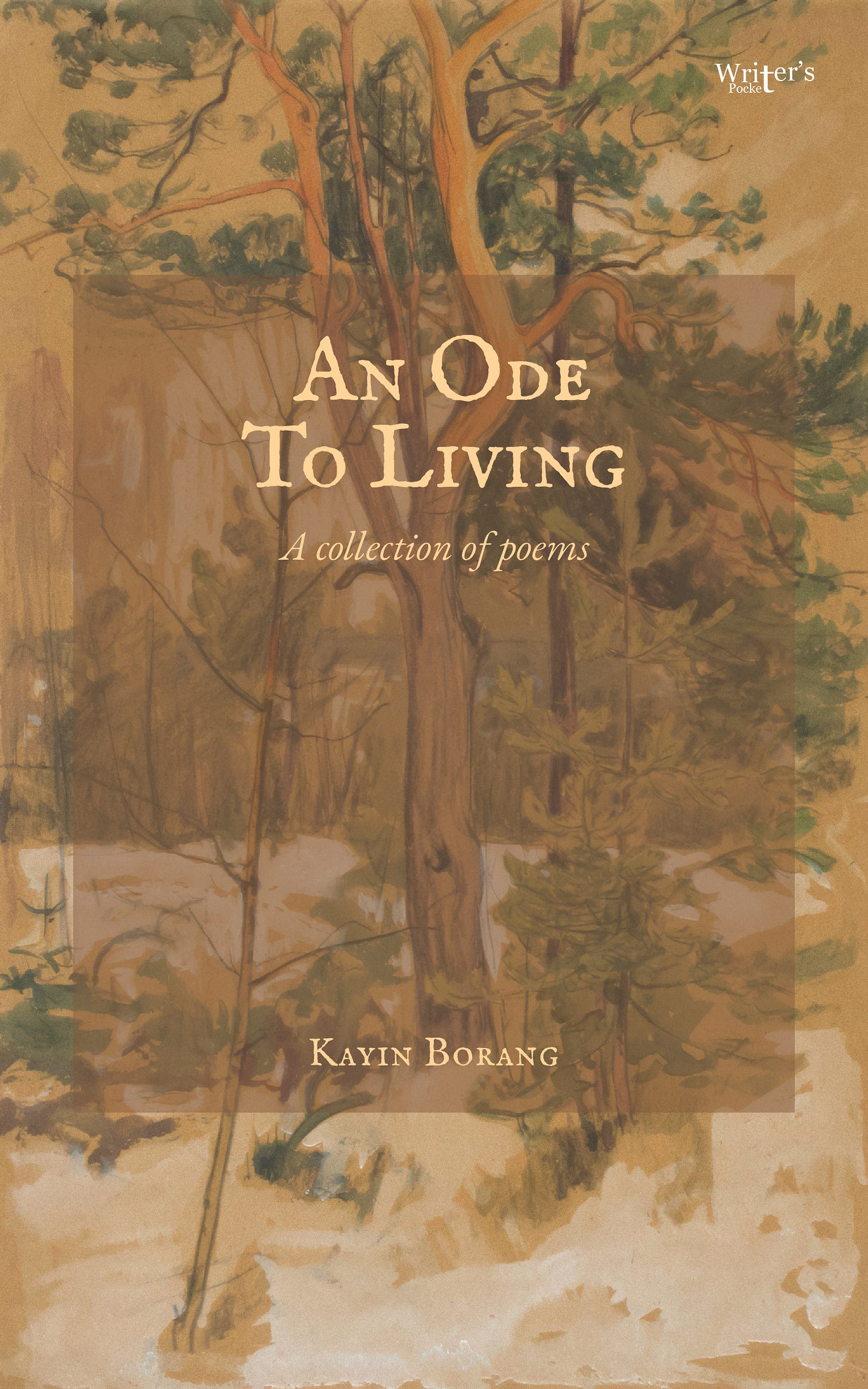Hello my loves! I am so excited to be starting a new series: Writers’ Spotlight. In this series, I will be interviewing writers whose works I firmly believe in and endorse, in hopes of sharing their writing processes and inner worlds with the public. I hope to provide a platform to promote these writers’ works, help them connect with readers, as well as provide learning opportunities for audiences!
For Part 001 of this series, I have interviewed Kayin Borang (@kayinwrites on Instagram). Kayin is a young writer who primarily writes poems about nature and human relationships. We stumbled upon each other’s Instagram pages and after reading a few of his poems, I was struck by the thought that this was different. I simply loved what he was doing and wished to share it with others. His current collection is written in a very simple and structured style, very much like the Romantic poems of Keats and Wordsworth; a tone, which despite seeming antique, is surprisingly refreshing to stumble upon in a sardonic and modern world. His writing is very sensitive and thoughtful. I had the honour of receiving an ARC copy of his poetry collection, An Ode to Living, and reviewing it for him. No spoilers, but do put it on your TBR! In Part 001 of Writers’ Spotlight, we talk about his creative process, inspirations, the road to publishing and what young poets can do to improve their craft.
But first, some poetry from Kayin!
Keiyi (Y): Please introduce yourself briefly to the audience! Share as much as you’d like.
Kayin (K): My name is Kayin Borang. I was born on May 21, 2008, within the breathtaking landscapes of Arunachal Pradesh. Growing up surrounded by its natural beauty and diverse terrains has been a constant source of inspiration for me. I find joy in spending time in nature, immersed in books and my imagination. Nature holds a sentimental place in my heart, and I cherish the moments when I can simply disappear amidst its beauty. I am the fourth and youngest child of my parents. I do not enjoy social interactions, which often make me feel sick, so fading into oblivion amidst the wilderness has always been my escape.
Y: What got you into poetry at first?
K: Poetry was like an unknown guest who came to me on a random day in 2020. Somehow, it is now a part of my life—or rather, it is my life. I believe that certain things in life are meant for you and only you. No matter what the situation or condition of your life might be, it will knock on your door unannounced, if it is meant for you. That is what happened to me with this passion for writing poems. But, to be more specific, it occurred when I was brainstorming birthday gift ideas and someone suggested writing a poem. Despite my sparse knowledge on the subject at the time, I wrote my first poem for my sister and I fell in love with the process.
Y: What themes do you usually fixate on in your poems and why?
K: I believe poetry is a window to our souls, and that it often deals with humanity and life's workings. Accordingly, my poems mostly focus on the simplicity of life and the daily experiences of human beings. They are love letters to living in the natural world. Especially in this modern time, we often overlook such precious moments, enclosing ourselves within digital spheres and wasting time by scrolling mindlessly. What I am trying to do is persuade others to start being more appreciative and mindful when spending time with nature and the people they love.
Y: You use a lot of nature imagery in your poems. Are these inspired by your daily surroundings? What’s your favourite element of nature?
K: Nature has always been a friend to me. Being born in Arunachal Pradesh, renowned for its natural beauty, shaped and inspired my poetic vision.
There are no favourites among the elements of nature, but a specific part that moves me is the musical performances of earthly singers like crickets, cicadas, or even the Mourning Dove. Their voices carry a poignancy and melancholy that resonates deeply with me. It reminds me of childhood and forgotten memories.
Y: In many of your poems, you adhere to strict rhyme schemes and meters. What is the significance of structure in your writing and why do you choose to write like that?
K: While I deeply love free verse, I find an incomparable beauty in rhyming poems. I often write in this form to honor the legacy left behind by our ancestral poets. While free verse has been practiced for ages, I believe it's important for us to return to our roots at times. Writing in rhyme helps preserve the traditional art of poetry and connects us to a rich poetic heritage.
Y: Which poets most inspire you?
K: I have a wide variety of poets who inspired my voice, but the most significant among them are Emily Dickinson, William Wordsworth, and Mary Oliver. Dickinson is a poet who says many things in just a few lines, and that's been something I've aspired to do for a long time. Wordsworth is a poet with whom my artistic spirit resonates deeply. My initial stages were filled with his works. His passion for nature and simplicity evoked a romantic soul in me. Mary Oliver is another poet who has given me a new love for free verse. Before her, I didn't enjoy free verse much, but she proved me wrong and inspired me to explore and write in this genre!
Y: What do you think is the role of a poet in the modern world? Has poetry become more or less accessible to the masses throughout the decades?
K: Poets have long been some of history's greatest storytellers, and I believe they continue to play that role in our modern world. Their work serves to preserve our past and reflect our present. As for whether poetry has become more accessible to the masses throughout the decades, yes, I believe so. As society evolves, so does poetry's accessibility. Poetry of past ages often addressed specific social or political contexts, whereas modern poetry tends to explore personal feelings and experiences. This change, coupled with simpler language and a broader range of themes, has made poetry more relatable and engaging for contemporary audiences.
Y: We’ve had a conversation before about self-publishing versus traditional publishing. You have your poetry collection An Ode to Living coming out with Writer’s Pocket soon, would you care to share a little more about the process, and whether you’d still choose to publish traditionally after this experience?
K: For An Ode to Living, I started preparing and collecting the poems I wanted to feature in this collection in March 2024 and finished the manuscript in May. The book is currently being printed. I really admire the concept of self-publishing, but I've come to realize it's not the right path for me. Traditional publishing seems more feasible for reaching buyers and readers quickly, so I would still approach traditional publishing the next time round.
I'm currently focused on my next project, which I'm starting earlier to allow time for pitching to larger publishers. Looking back, I see where I could have been more patient and direct in my communications with publishers during the process of creating my debut poetry book. When you’re working with a lot of people, your thoughts and concerns differ from each other so we had a hard time figuring out the cover, fonts and formatting of my book. There were some missed opportunities due to miscommunication, but it's been a learning experience. I plan to apply these lessons to my next collection.
Y: Being fairly young yourself, what do you have to say to encourage other young poets out there? How can they improve their skill?
K: As a young writer, I'm still learning myself, but my five years of writing poems have taught me invaluable lessons. For those entering the poetic realm, I would encourage patience and extensive reading of poems. Creativity is unpredictable and may not come regularly, so patience is essential. Seek inspiration by brainstorming or immersing yourself in nature. Everyone's journey is unique, so my advice may not carry much weight, but I urge aspiring poets to practice, read widely, be patient, and fearlessly share their raw writing with the world—this authenticity defines your voice. Ultimately, mastering poetry requires a deep belief in oneself.
“An Ode to Living is a short collection of poems that celebrates the splendor of nature while probing the depths of human emotions. From verses inspired by the brilliant sunrise to the placid mystery of the night, this anthology transforms transient moments into reflections on hope, joy, and sorrow. Crafted with a lyrical touch and a gladness for the gifts of life, it offers a romantic and contemplative journey through the natural landscapes with an appreciation for the very act of living.”
An Ode to Living is now available for purchase and is priced at 200 INR (2.39 USD). International shipping is limited to the USA, UK, select European countries, Canada, Australia, Gulf countries and Japan. Available on Amazon, Flipkart and Kindle. Visit this link if you’re interested in Kayin’s work!









